
Keidanren's Committee on Mobility held its first meeting with the Prime Minister and Cabinet ministers, bringing the public and private sectors together to strengthen Japan's competitiveness and focus on the future.

“We were able to kick off efforts to strengthen Japan’s competitiveness and move towards the country’s future,” President and Chairman of the Keidanren Committee on Mobility Akio Toyoda told reporters following mobility-focused discussions between the government and Keidanren (Japan Business Federation) on November 2.
This marked the first opportunity for the Committee on Mobility, established in June, to meet with government officials. The session was attended by Prime Minister Fumio Kishida and eight members of his cabinet, with the committee represented by seven members led by its three chairs: Akio Toyoda, Masakazu Tokura (Keidanren Chairman, Sumitomo Chemical Chairman of the Board) and Koji Arima (Denso President & CEO).
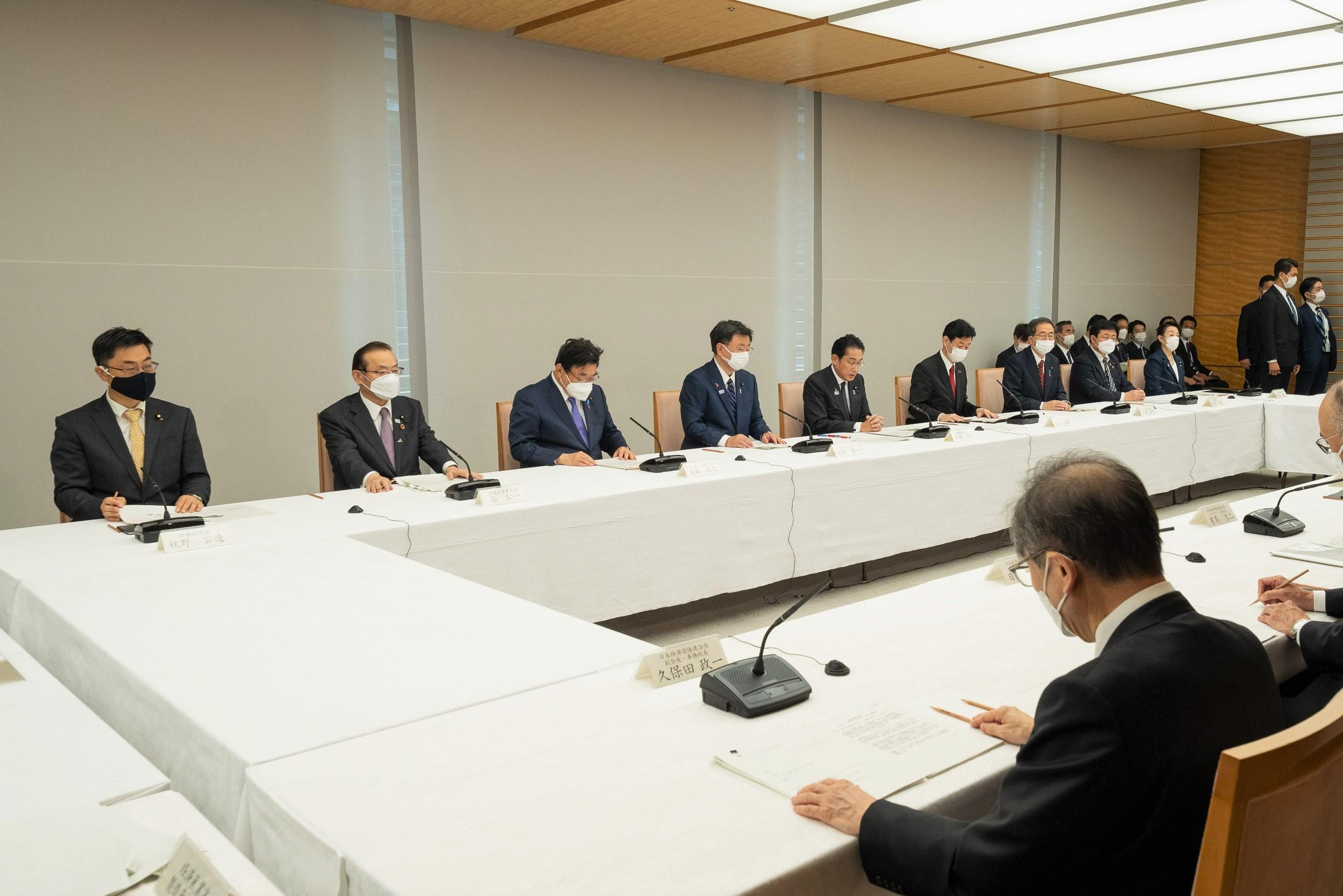
The meeting allowed participants to reach a shared understanding of the automotive industry’s contributions to Japan’s economy and employment, as well as its vision for the growth of the mobility industry.
Below are the full statements made by the committee’s three chairs and Prime Minister Kishida’s summarizing comments.
Tokura: “In pursuing a green transformation, the transition is crucial”
Chairman Tokura
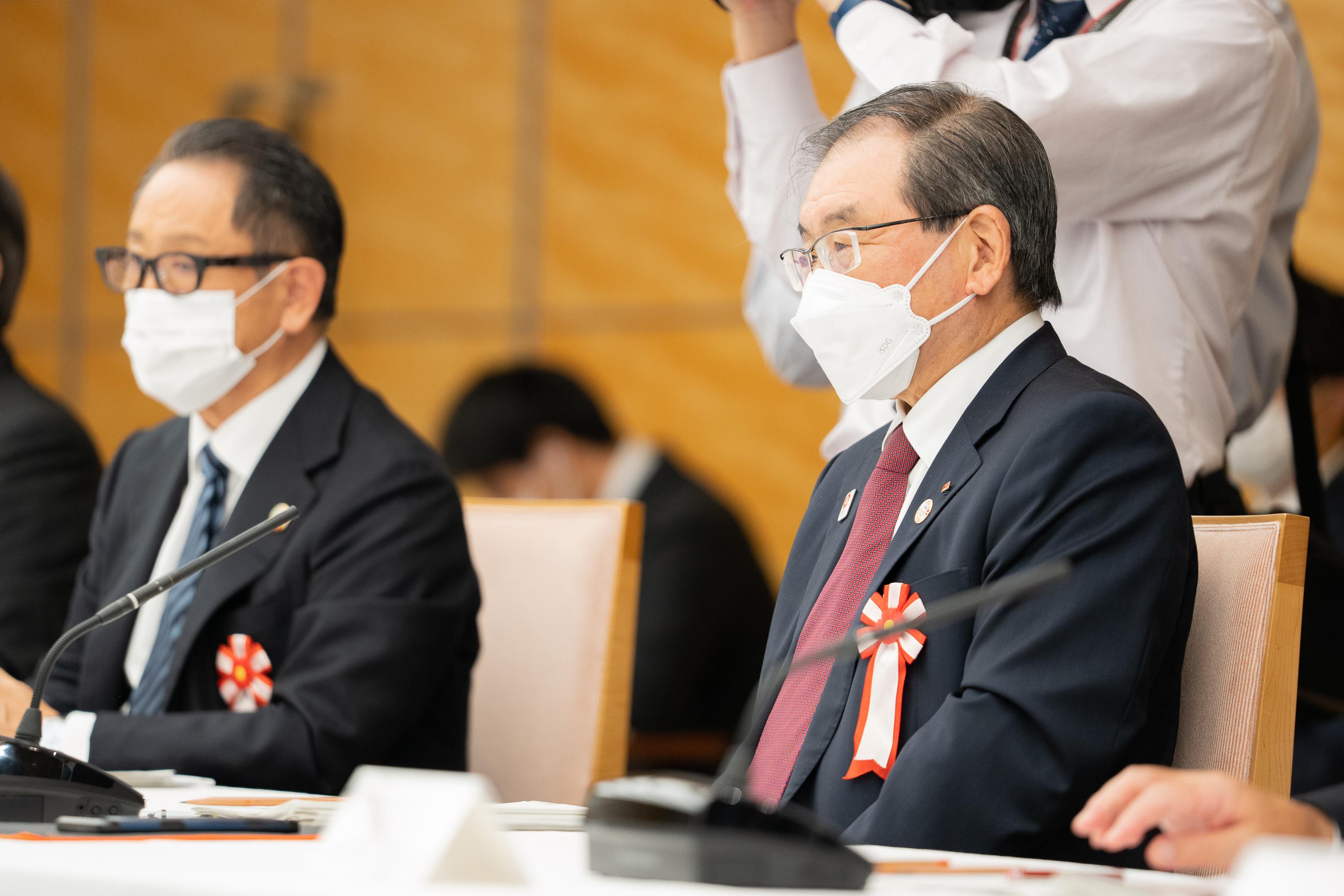
Thank you very much to Prime Minister Kishida for this opportunity to discuss the future of mobility, the industry that will drive the growth of our country.
Given the importance of mobility as a ministry-spanning issue, I would also like to express my sincere gratitude to the ministers for taking this time to listen to voices from the industry.
Rebuilding a strong, sustainable Japanese economy amid turbulent global conditions requires not only accelerated digital and green transformations, but also the urgent development of industries that will drive future growth.
To that end, in June, Keidanren established three new committees on Bioeconomy, the Creative Economy, and Mobility.
Mobility in particular is a wide-ranging core industry in Japan, playing a key role in creating a virtuous cycle of “growth and distribution” and revitalizing a broad middle class.
Over 200 companies from diverse fields and industries have registered as part of Keidanren’s Committee on Mobility, a testament to the high level of interest among our corporate members.
Personally, when I think about mobility, I find myself recalling the words of scientist and futurist Roy Amara, which became known as Amara’s Law: “We tend to overestimate the effect of a technology in the short run and underestimate the effect in the long run.”
It goes without saying that, in pursuing a green transformation, the transition process is crucial in the short term, as the shift to EVs or autonomous driving will not be instantaneous.
At the same time, technology is constantly evolving, meaning that current technologies will lose their relative dominance in the near future. From a long-term perspective, therefore, we must earnestly engage with both EVs and autonomous driving today.
Based on these short- and long-term perspectives, transitions, and goals, we hope to move forward with joint efforts across all sectors to ensure that the mobility industry, which holds the key to Japan’s future competitiveness, serves as a worthy pacesetter.
Companies on the mobility committee are also keen to see the government provide support for R&D and infrastructure development, and proactively ease regulations to facilitate trials and rollouts of new mobility services and technologies.
Others also express hopes for cross-ministry initiatives and government involvement in setting international rules.
I currently serve as chairman of the Japan Association for the 2025 World Exposition, to be held in Osaka, Kansai. I sincerely believe that the expo provides an ideal opportunity to demonstrate the vision for Japan’s mobility industry, including EVs and autonomous driving, serving as a showcase for our future society.
This being the first such meeting, most of the people representing the business community here today are from the automotive industry, which is expected to be the driving force behind the mobility industry.
We look forward to working closely with the government to develop the mobility industry, and would be grateful to hear your views on taxation and other aspects.
Toyoda: “The people of Japan continue to strive”
Chairman Toyoda
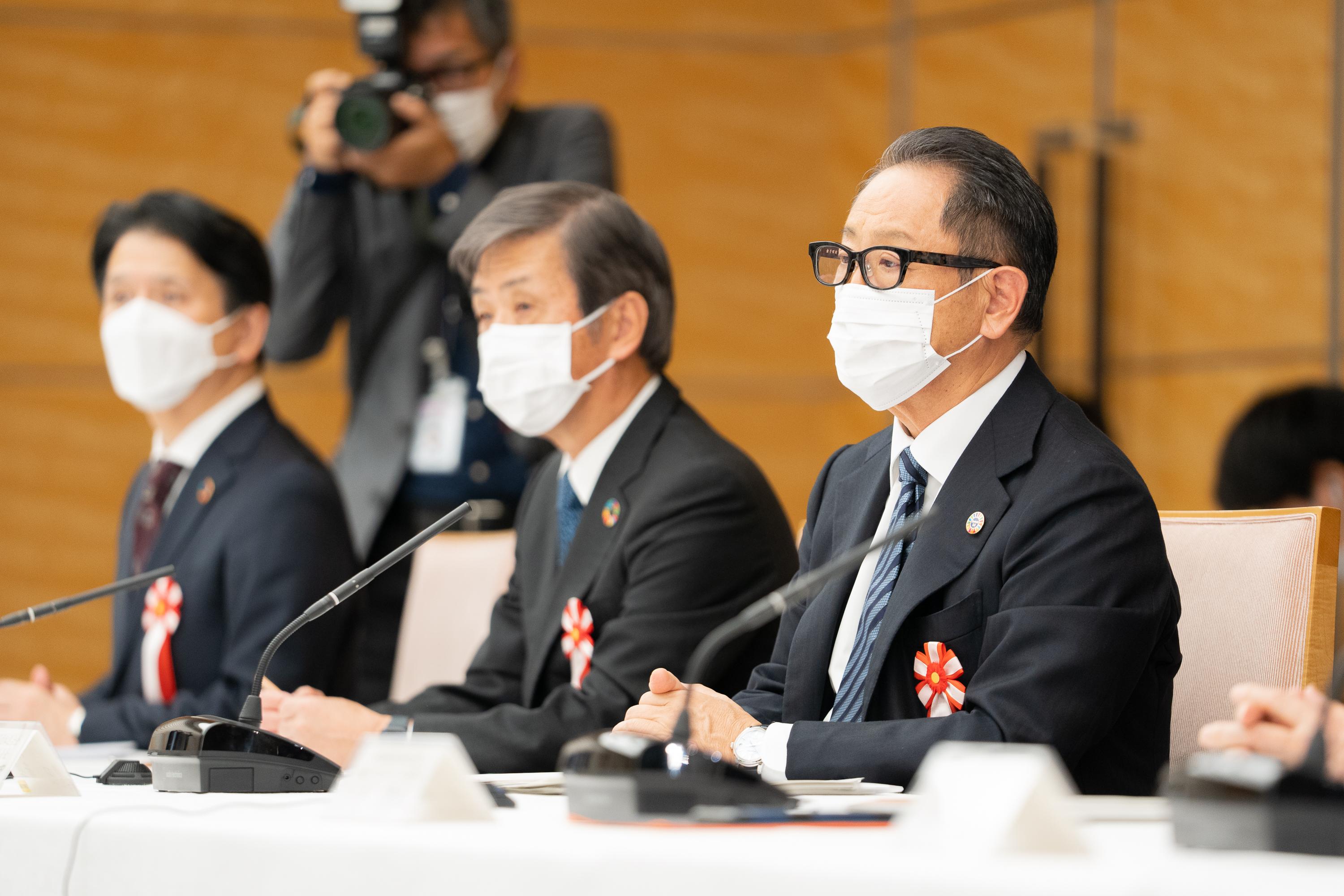
I believe that Japan has maintained its global competitiveness so far thanks to a broad middle class, and the time has come for that competitiveness to be re-established.
Perhaps the most important factor in achieving this is that the people of Japan continue to strive.
Allow me to briefly explain what I mean by “continuing to strive” in terms of the past, present, and future of the auto industry.
We have grappled with various crises, from the oil shocks of the 1970s to the trade frictions and soaring yen of the 1980s, followed by the collapse of the bubble economy and the rise of emerging nations in the 90s.
And yet, the automotive industry has always stayed ahead of the times, as everyone has continued working diligently to overcome these crises and achieve sustainable growth.
Similarly, as countries make efforts in the pursuit of carbon neutrality, Japan’s auto industry has led the world by cutting CO2 emissions by 23% over the past 20 years. We achieved that by drawing on our strengths across the full lineup—from minivehicles to motorcycles and heavy-duty vehicles—and working to develop fuel-efficient technologies and expand our pioneering range of electrified vehicles.
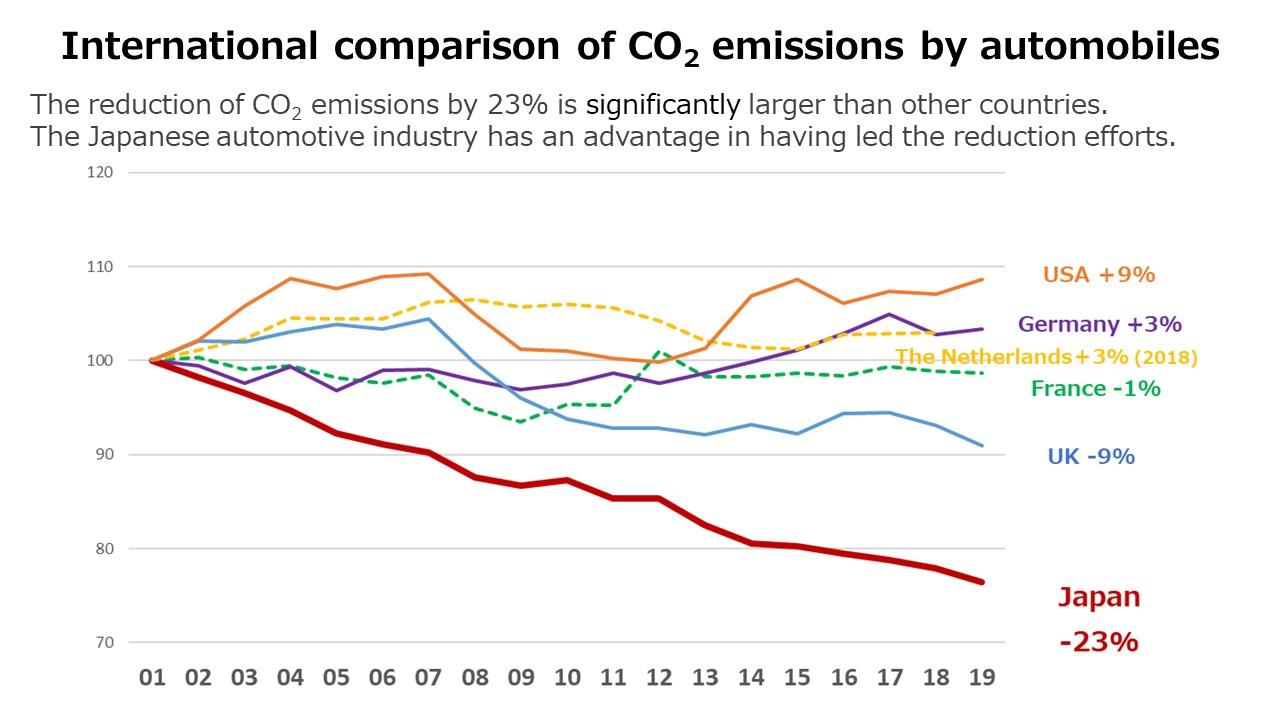
The results of these efforts can be seen by comparing the industry in 1980 with today. Sales have risen significantly from 20 trillion yen to 60 trillion, as have tax contributions and foreign currency earnings, each from 8 trillion to 15 trillion yen.
Even after the Global Financial Crisis and other hardships, the industry has sustained employment for 5.5 million people.
Likewise, during the current pandemic, the auto industry added 120,000 workers even as Japan’s economy shed 880,000 jobs overall. I hope you will appreciate these facts as well.
By nature, Japan is a country that imports resources and turns them into products, which are exported to earn trade income. The auto industry has a track record of consistently investing in and protecting the country’s manufacturing base, employment, and competitiveness on the world stage.
Moreover, while Japan as a whole has seen sluggish income growth and widening inequality, the auto industry continues to distribute its gains among diverse stakeholders, including employees, shareholders, and suppliers. By contributing to a virtuous cycle of growth and distribution, I believe the industry has helped to maintain a strong middle class.
In June, the Prime Minister took time out of his very busy schedule to visit our Motomachi Plant, where he witnessed a mixed production process assembling everything from compact mobility vehicles to the new Crown and a BEV model. I believe the Prime Minister saw firsthand how difficult it is to expand options on the production floor.
What makes it possible for us to prepare for the future is the expertise, ingenuity, and tireless effort of our frontline workers.
I would like to think that seeing the source of our competitiveness also encouraged the Prime Minister to stand up singlehandedly against the proposed regulation target on zero emission vehicles at the G7 summit held later that month.
For the Japanese economy to regain its strength, as a resource-poor country we must rely on the only resources we do have—our people—to pool their knowledge and ingenuity and work hard to spur technical innovations and high productivity. Fortunately, I believe Japan has maintained its strong frontlines in manufacturing.
The automotive industry has done its utmost to preserve this reliable model for Japanese competitiveness, which is why I have continued to call for the sector to serve as a pacesetter when considering growth and distribution.
Japan’s auto industry has continued to lead the world thanks to the strength of its production front lines. I believe that political resources must be devoted to these areas where Japan’s strength lies.
We will continue working to further strengthen our frontline manufacturing by incorporating digital solutions and drawing on the expertise of new partners.
In doing so, I believe we have great potential to enrich people’s lives by solving social issues, including in rural communities, creating new value, and contributing more as a mobility industry.
We can expect the future benefits to be considerable. As we will discuss in more detail later, there is potential to boost the economic contribution from the current 60 trillion yen to 100 trillion, employment from 5.5 million jobs to 7 million, and tax revenues from 15 trillion yen to 25 trillion.
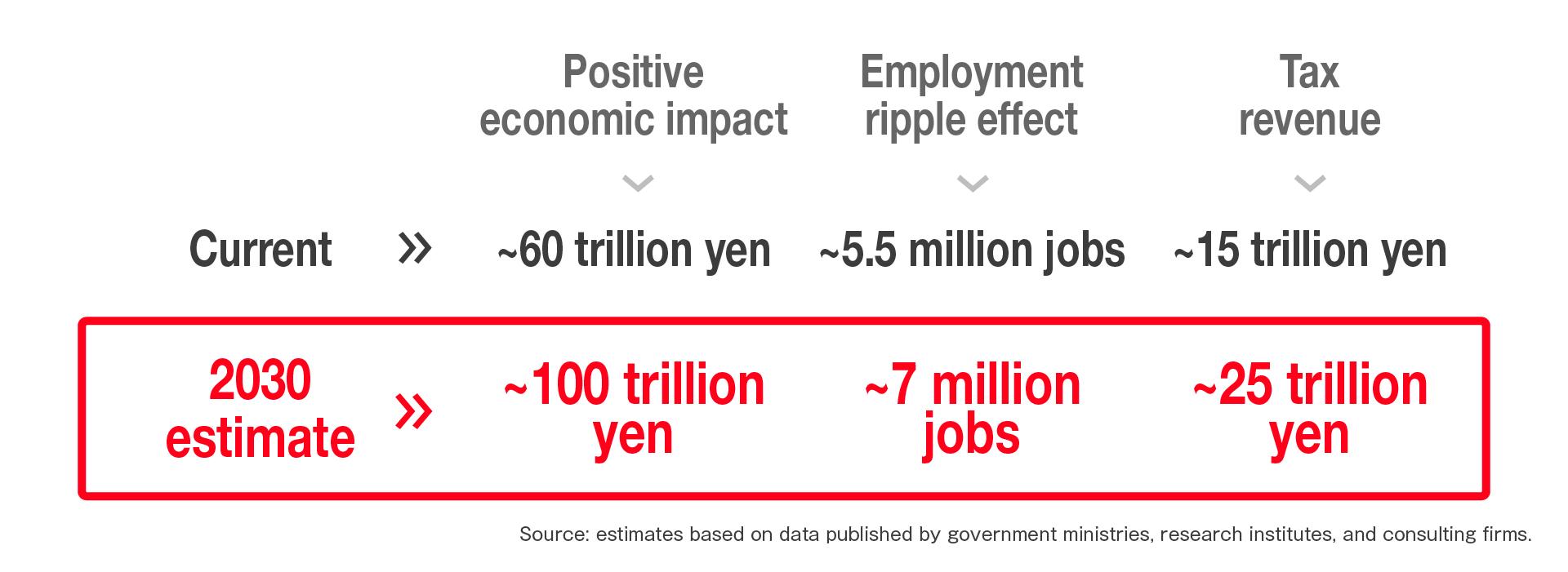
In terms of pursuing carbon neutrality, given the harsh realities of greening the country’s energy supply, Japan needs to follow its own path to reduce CO2 emissions that fully leverages our strengths in hybrids, minivehicles, motorcycles, and hydrogen, rather than going all in on BEVs.
We hope that the government will be bold in considering how to make the most of Japan’s strengths while placing mobility at the center of these policies.
And, rather than solely relying on regulation to make changes, I hope that you will provide us with assistance, including an overhaul of the tax system to firmly support one of Japan’s core industries, so that we can continue working diligently to ensure that mobility development goes hand-in-hand with the pursuit of carbon neutrality.
Arima: “SMEs remain the cornerstone of competitiveness”
Chairman Arima
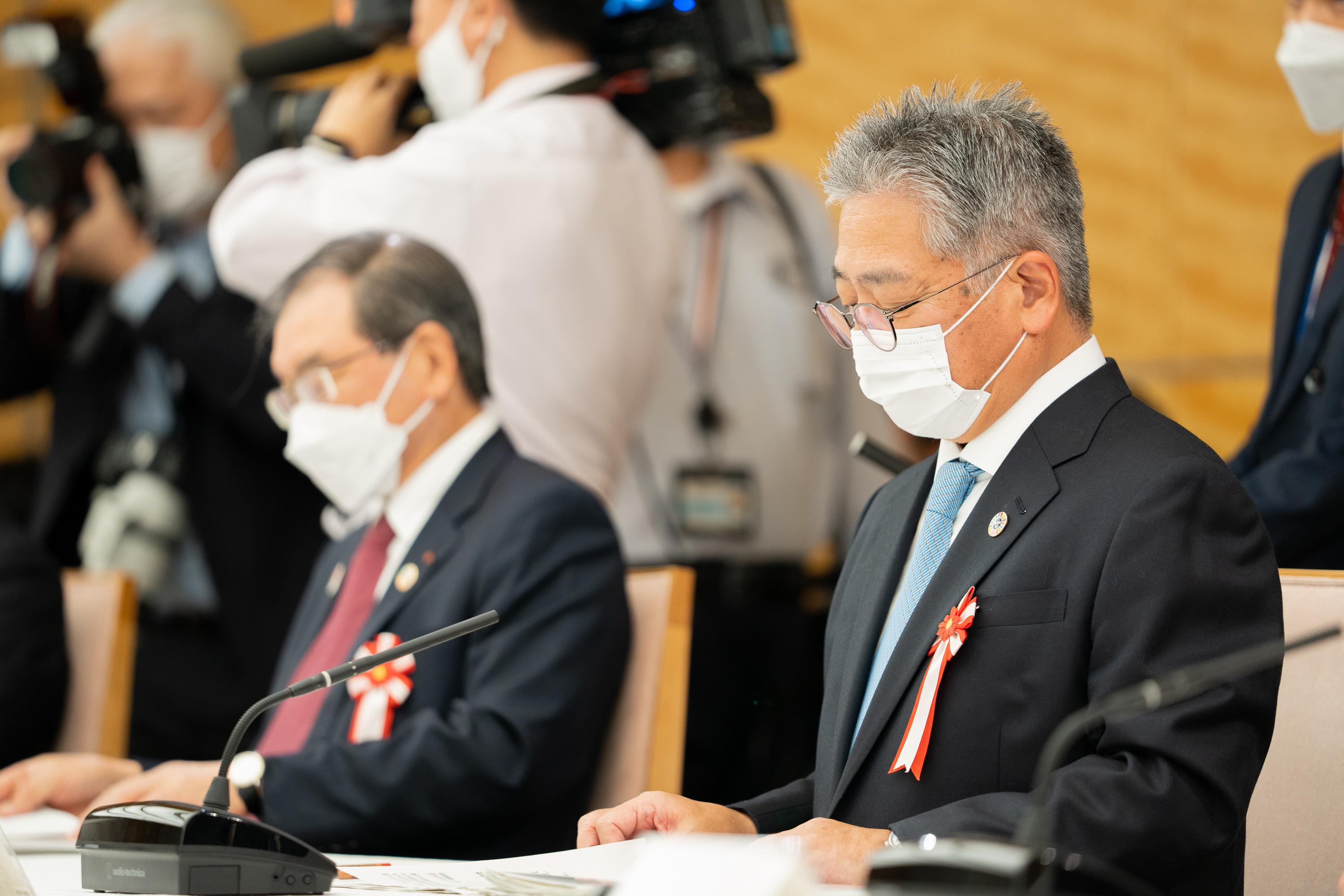
Ninety percent of the companies that make up the country’s auto parts industry are small and medium-sized enterprises. Even if the auto industry evolves into a new mobility industry, we believe that SMEs will remain the cornerstone of competitiveness.
Moreover, in addition to carmakers and small and medium-sized suppliers, the auto parts industry is connected to a diverse network of partners, including those in the infrastructure, energy, materials, and logistics sectors.
Just as Minister Nishimura spoke earlier of “new collaboration across industry lines,” we believe that collaboration unbound by conventional frameworks is crucial for the automotive industry to remain relevant in a new mobility society.
In this light, we want to help solve challenges throughout the supply chain by serving as the glue that binds companies in stronger cross-sector collaboration.
Chairman Toyoda mentioned the need for Japan to follow its own path that draws on the country’s strengths. Similarly, I believe the SMEs of our auto parts industry can contribute to cutting CO2 emissions by further honing and leveraging the strengths we have cultivated to date.
To achieve carbon neutrality, it is also essential that every element of the supply chain, regardless of industry or size, is digitally integrated, and this is one area where government and business must work together.
We will continue to expand our green and digital transformation initiatives to make supply chains, including the SMEs rooted in regions around Japan, more resilient and help revitalize the domestic automobile market while energizing local industries and lifestyles. We look forward to the government’s assistance in these efforts. Thank you.
Kishida: “The auto industry is a central pillar of the economy and job creation”
Prime Minister Kishida
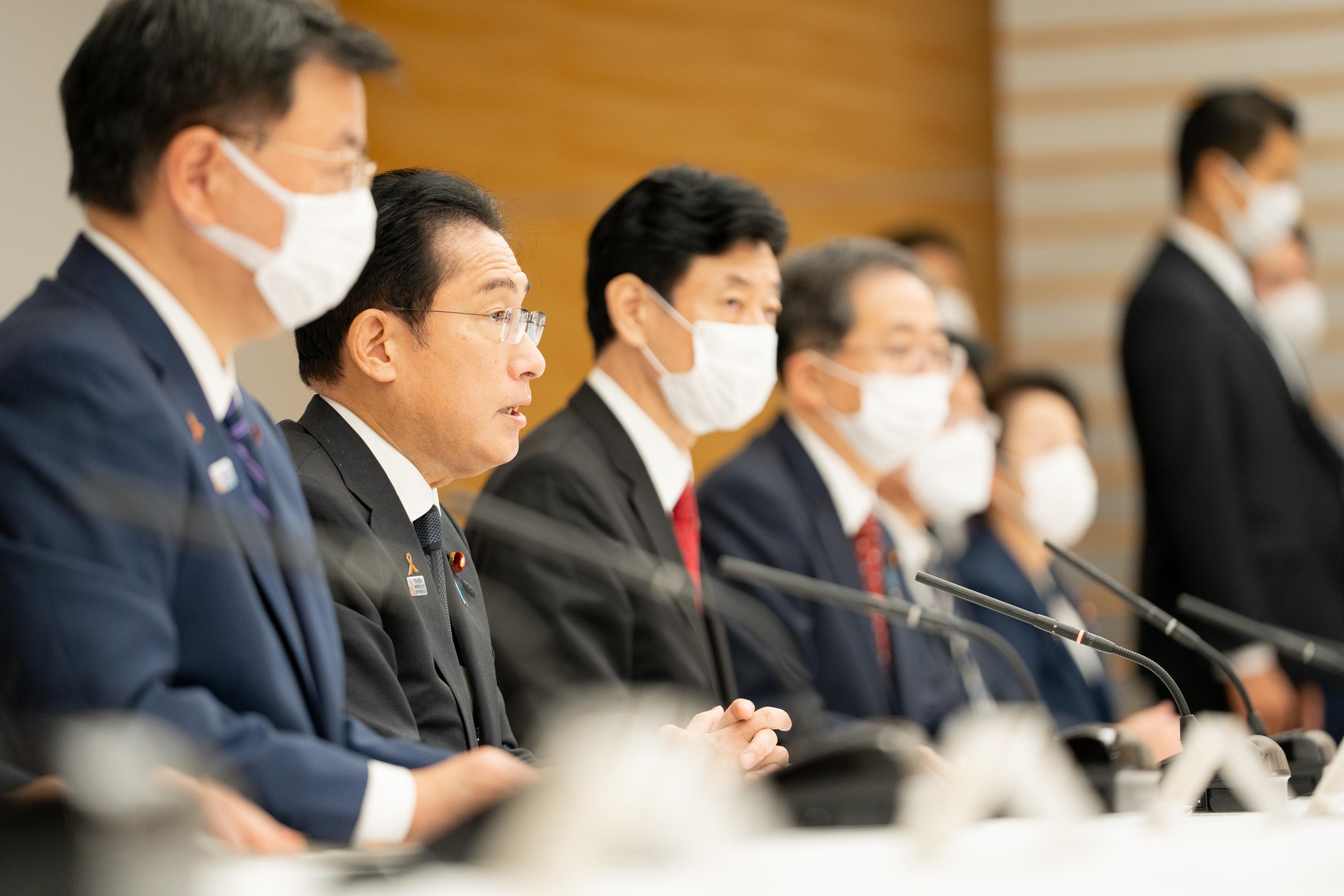
Today, we heard from members of the business community about their vision for the growth of the mobility industry.
Having sustained domestic manufacturing and wide-ranging networks of related industries, the auto industry is a central pillar of the economy and job creation in Japan. As we stand at this turning point in history—with major transformations such as decarbonization and digitization and intensifying international competition, both between companies and regions—our public and private sectors must strive together for further growth in order to protect the country’s economy and jobs.
By expanding and linking up wide-ranging sectors such as urban development, services, energy, and IT around the core auto industry, we can tackle various social challenges including transportation and green initiatives, helping to create economic growth and a sustainable society.
The mobility sector must be a central axis of new capitalism. To achieve both growth and solutions to social challenges such as decarbonization, Japan needs a robust and advanced automotive industry at the core of its global business ambitions.
At our next session, I hope to have candid discussions regarding what the public and private sectors should prioritize in order to strengthen Japan’s mobility industry amid a global order that is rapidly changing due to geopolitical constraints on supply chains and the push toward decarbonization.
Finally, our government deeply appreciates the industry’s track record of proactive efforts in areas such as wage increases and fair business practices. We look forward to your continued cooperation.
The significance of government-Keidanren dialogues
“The significance lies in bringing together the Keidanren chairman and the prime minister to speak face-to-face as part of a mobility committee,” says Committee Chairman Toyoda of the recent meeting.
Carbon neutrality is an issue that affects every individual, requiring an all-Japan effort that transcends industry boundaries. As such, the fact that action is being taken by the comprehensive business group Keidanren, not just auto industry bodies, is important.
These public-private dialogues will continue, aiming to strengthen Japan’s competitiveness and future outlook.

